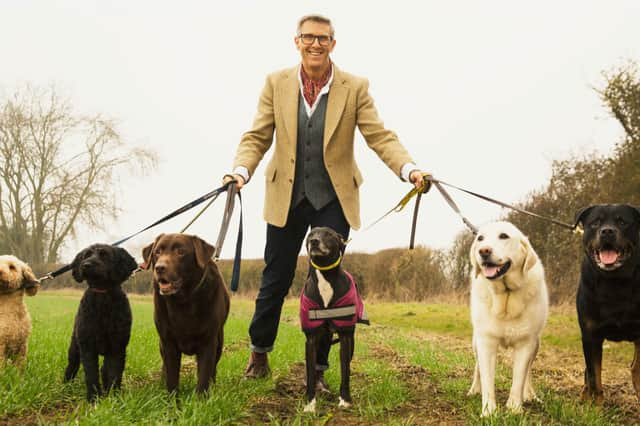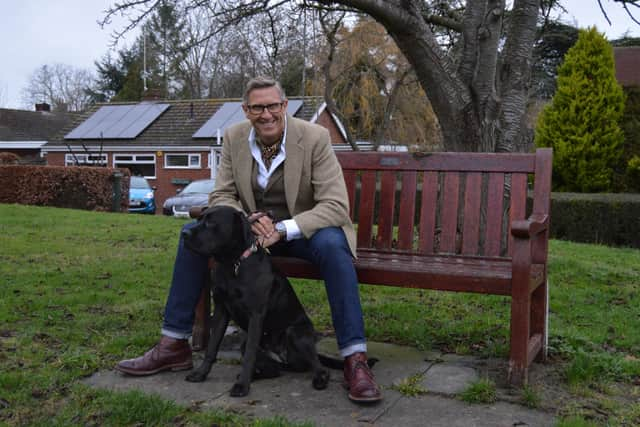Graeme Hall: Words of advice from TV’s The Dogfather


Then aged 40, he had mapped out a short break before trying his hand at management consultancy – “I’d seen lots of these guys come into Weetabix and do what they do and thought I can do that,” he explains – but then fate intervened.
Having recently become the owner of two Rottweiler puppies, Axel and Gordon, Hall decided to take them to a dog training club near Birmingham, and the next three months spent learning the tricks to good canine behaviour would change far more than he expected.
Advertisement
Hide AdAdvertisement
Hide Ad“It was a case that they’d got to be perfectly behaved because of the breed – it doesn’t take much for a Rottweiler to scare somebody when they’re being good,” Selby-born and now Cotswolds-based Hall says. Being “one of those people who believes if a job’s worth doing do it well – which is quite a Yorkshire thing”, he threw himself into the training programme, working daily with his dogs and attending classes twice a week.
As he neared the end of his three-month sabbatical, the head trainer at the club asking him what job he was planning on doing next. “I said I was going to be a management consultant and he said, ‘Well, you could, but why don’t you be a dog trainer?’ I said, ‘Why do you think that?’ What he said next literally changed the course of my life because he said, ‘I think you’re quite good with people’ and I thought, ‘That’s a surprise, what about dogs then?’ He said, ‘You’re good with dogs but lots of people are, and you can only fix the dog through the people’.”
Fixing the owners would become the central theme of his work over the next decade and a half, and would lead to Hall being hailed as “Britain’s best dog trainer” and dubbed ‘The Dogfather’. Since 2017 he has presented the Channel 5 TV series Dogs Behaving (Very) Badly, in which he travels around Britain helping people and their unruly pets.
The idea for the show came from a TV production company, who invited him to London after picking up on the popularity of his website. Hall recalls a 20-minute conversation with their boss who “funnily enough, was a Yorkshireman, from Dewsbury, so he was a man of few words, but (at the end) he said, ‘Right, let’s spend some money’ and that’s when I knew he was serious, so we did a pilot”.
Advertisement
Hide AdAdvertisement
Hide AdHall says he has “taken inspiration from lots of different places” for his own style of training, but his biggest single influence was “the head trainer at the Birmingham shooting club, a guy called Travis, he just instinctively got it, not an academic person but brilliant with dogs”. “I remember one of the things that he said, which was ‘it’s not the qualifications that you’ve got, the letters after your name, it’s the number of dogs that have been through your hands’.”


The 5,000 dogs that have passed through Hall’s hands certainly attest to his considerable knowledge and experience.
Today, he believes the whole idea of dog training has become more scientific in the 21st century. “There are studies all the time on how dogs perceive the world, so we know an awful lot about where on a human face they’re looking to try and figure out what we’re thinking,” he says.
“A couple of decades ago it would have been up for debate whether dogs actually could read our expressions. Well, we know now they actually can because through video technology tracking their eyes we know exactly where on our faces they’re looking at. You might be surprised: it’s actually your forehead is one of the main places. The muscle which goes right across your forehead, the one that creates frowns and so on, and also drives your eyebrows. If you’re doing a quizzical frown or happy they get a bit of input from that.”
Advertisement
Hide AdAdvertisement
Hide AdDogs also sometimes watch humans’ nostrils. Hall explains: “The reason for that is when we’re fearful our nostrils flare and dogs pick up on that. Twenty years ago it was said dogs could smell fear and I always thought yes, they could smell adrenaline but it must take a while for that smell to seep out of our pores and across to the dog. There are dogs who stand in the road and instantly go ‘aha, you’re scared’, so it must be visual. We’re learning all the time how dogs pick up on things and it informs how we train them.”
Last year he released his first book, All Dogs Great and Small, in which he talked about the golden rules that he learnt from training dogs. This week sees the publication of his second tome, Perfectly Imperfect Puppy.
“All Dogs Great and Small covers all ages of dogs, we went from puppies right towards the end of life,” he says. “With Perfectly Imperfect Puppy we thought lots of people have bought puppies in the lockdowns and that’s something that is going to continue, and one of the promises when you look at books on the subject is that it’s going to be perfect, and sometimes we’re promised that it’s going to be easy as well. A bit like when a baby comes along, you can prepare as much as you like, but the truth is what you need to be prepared for is it won’t quite go to plan, it won’t be perfect.
“Also you need to be prepared for the fact that there’s quite a bit of work involved with a puppy, so it’s not easy. It’s not complicated, but it is work. When we were tossing around for a title we thought it’s a bit like human relationships, the perfectly imperfect puppy would be the title for the book. If you do it right, sure, things won’t go quite smoothly but you’ll end up with a puppy that’s perfectly imperfect for you.”
Advertisement
Hide AdAdvertisement
Hide AdIn his book, Hall sought to cover “everything from before you get a puppy, what’s the right puppy for you, what to do from before the day when you pick them up, what to do on the day and everything beyond that right up to adulthood”. He believes many first-time owners overlook the fact that the key to a good relationship with your puppy is it’s a partnership. “At the risk of stating the obvious, they’ve got a mind of their own,” he says. “Sometimes in dog training we talk as if they are little robots and everything is going to go exactly to this prescribed plan. Well, if I’ve learnt anything from 5,000 dogs, usually it doesn’t go to plan, it’s always a partnership and like a lot of partnerships, sometimes one party takes the lead, particularly if they’re more experienced, so it’s very much like parent and child.
“I know there’s a danger of anthropomorphising but there are lots of similarities, and actually one of the things I did when I was researching the puppy book was I looked at some mum and new baby books, just to see how they were laid out, and there’s actually some inspiration in that. So it’s a partnership but also one where the human really wants to be taking the lead. It’s just getting that balance right.”
Also, he says he is keen for people to know about the “teenage stage”. “You sometimes get to five or six months old and think ‘the dog does everything, sorted’ and then adolescence comes in and they do the dog equivalent of what human teenagers do, they start going, ‘No, why should I? Make me’ and they come out the other side, like human teenagers, but it’s forewarned is forearmed, that one. If you know, people are going to do the right thing and it will come back again and it’ll be OK. If you don’t know it’s often when dogs get rehomed because good people get to that age and say ‘we’re obviously doing it wrong, we can’t give this dog what they need, so maybe we should let them go’. it’s so sad when that happens.”
Next month, Hall heads out on his first live tour. The evenings will contain a mixture of anecdotes, advice and a chance for questions and answers. “We’re going to split it into two,” he says. “Quite often with these sort of events, the Q&A is an add-on to fill a bit of space. The whole second part of my show is Q&A from people within the audience, based on questions they’ve asked in advance. It’s your chance to ask me a question in person.
Advertisement
Hide AdAdvertisement
Hide Ad“In part one it’s a little bit based on All Dogs Great and Small, so I’m going to go through my three and a half golden rules and illustrate that with a few stories, and we’re going to talk about a few things that happen behind the scenes on the telly series where it’s relevant as well, and a few little fun stories along the way. My intention is, a bit like Dogs Behaving (Very) Badly, it’s going to be entertaining as well as educational. I want people to walk out of the theatre thinking that was fun but I learnt a couple of things there. If I achieve that then we’ve done well.”
Perfectly Imperfect Puppy is out on Thursday March 17 (Ebury Spotlight, £14.99). All Dogs Great and Small is also out now in paperback, priced £8.99. Graeme Hall – The Dogfather Live on Stage is at Leeds City Varieties on April 13, Halifax Victoria Theatre on April 16, Hull City Hall on April 27, Huddersfield Town Hall on June 9, Bridlington Royal Hall on June 12, and York Barbican on June 13. graemehalllive.com
Comment Guidelines
National World encourages reader discussion on our stories. User feedback, insights and back-and-forth exchanges add a rich layer of context to reporting. Please review our Community Guidelines before commenting.